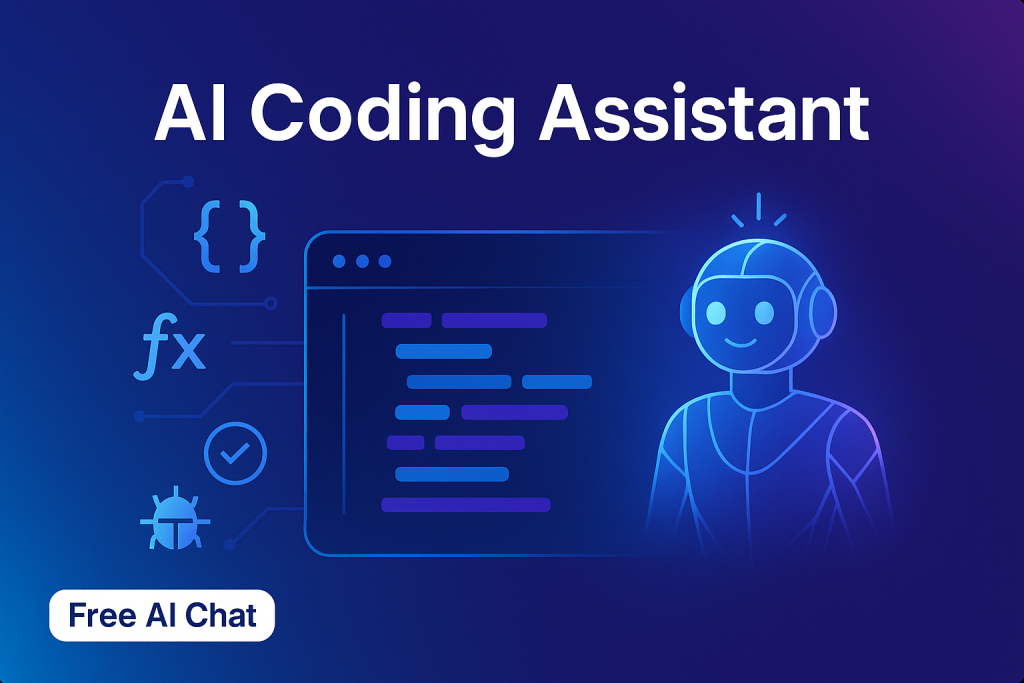Ship better code faster with an on-page pair programmer. The AI Coding Assistant helps you generate snippets, fix bugs, write tests, and explain errors for Python, JavaScript/TypeScript, Java, C#, Go, SQL, and more—using clear, safe patterns you can trust as a starting point. Built for students, indie makers, and teams who want quick, well-structured drafts to refine in their IDE.
Coding Assistant
Free AI Coding Assistant
Try our other AI Assistants
What It Is & Who It’s For

An on-page AI pair programmer that helps you generate code, explain errors, debug issues, refactor functions, and write tests—directly in the chat. It supports multiple languages and popular frameworks, giving you fast, well-structured drafts you can review and run in your IDE.
Who it’s for
Beginners & Students
- Learn syntax with clear, step-by-step explanations.
- Get starter templates and comments to understand “why,” not just “what.”
- Turn homework prompts into small, working examples you can study.
Professional Developers
- Scaffold features quickly (endpoints, services, components).
- Refactor for readability and performance with suggested patterns.
- Generate unit/integration tests and docstrings on demand.
Data & ML Engineers
- Create data-cleaning and ETL snippets (pandas/NumPy/Polars).
- Draft feature engineering steps and evaluation helpers.
- Spin up FastAPI/Flask endpoints for inference or batch jobs.
Product & No-Code Builders
- Produce “glue code” for APIs, webhooks, and automations.
- Get examples for Stripe, Slack, Notion, Airtable, and REST/GraphQL.
- Move faster without deep framework knowledge.
QA & DevOps
- Generate Jest/pytest/JUnit tests with edge cases and mocks.
- Draft CI workflows (GitHub Actions) and lint/test pipelines.
- Receive quick tips for logging, tracing, and config safety.
Key Features & Capabilities
- Multi-language coverage: Python, JavaScript/TypeScript, Java, C#, Go, PHP, Ruby, C/C++, SQL, Bash.
- Framework-aware help: React/Next.js, Node.js/Express/Nest, Django/Flask/FastAPI, Spring Boot, .NET, Laravel, Rails, Vue/Nuxt, SvelteKit.
- Debugging & error explanations: parse stack traces, identify root causes, and propose targeted fixes with examples.
- Code review & refactoring: improve readability, extract functions, reduce complexity, add docstrings, and suggest patterns (SOLID, DRY).
- Test generation: unit and integration tests with pytest, Jest, JUnit, NUnit—edge cases, mocks, and coverage goals.
- API & integration recipes: REST/GraphQL/gRPC, auth (OAuth2/JWT), pagination, retries, and rate limiting with ready-to-run snippets.
- Database & SQL helpers: schema design, migrations, joins, window functions, indexes, and query optimization tips.
- Security & reliability: input validation, parameterized queries, safe serialization, timeouts, retries, idempotency, and basic threat hints.
- DevOps & CI/CD: Dockerfile templates, GitHub Actions/GitLab CI pipelines, lint/test/build steps.
- Documentation & comments: generate READMEs, ADRs (Architecture Decision Records), and helpful inline comments.
- Code translation: convert logic between languages or frameworks while preserving behavior.
- Regex builder & CLI one-liners: readable patterns with plain-English explanations and quick shell utilities.
- Performance guidance: profiling pointers, Big-O notes, and memory-aware alternatives.
- Style & conventions: PEP 8, ESLint/Prettier, naming, folder structure, and commit message suggestions.
- Prompt controls: request specific constraints (complexity, memory, runtime, style) or “explain step-by-step” mode for clarity.
How It Works
Quick start (4 steps)
- Open the AI Coding Assistant and start a chat — the Free plan needs no signup.
- Describe your task or paste a snippet. Include language, framework, versions, and constraints (e.g., “Python 3.11 + FastAPI, async only”).
- Review the draft the assistant returns. Ask for changes: style, complexity, tests, comments, or alternatives.
- Copy to your IDE and run locally. Iterate in chat until it fits your standards.
Give the assistant the right context
- State runtime & versions (Node 20, Java 17, .NET 8, etc.).
- Mention libraries/frameworks (React 18, Django 5, Spring Boot 3).
- Paste the exact error/stack trace and a minimal reproducible snippet.
- Specify targets (performance, readability, memory, test coverage).
- Ask for docstrings/comments or unit tests if you need them.
Plans & token limits
- Free: 20,000 daily tokens — no registration required.
- Pro: $19.99/month — 200,000 daily tokens for heavier work.
- Premium: $179/year — 300,000 daily tokens for power users.
- Full details and upgrades: /subscribe/
Safety notes before you paste code
- Do not share secrets (API keys, credentials, proprietary code).
- Treat outputs as drafts: review for security, licensing, and edge cases.
- The assistant does not execute code; always test in your environment.
Tips & Best Practices
- Be specific up front: state the language, framework, versions, OS, and toolchain (e.g., Node 20, React 18, Ubuntu 22.04).
- Define the goal & constraints: performance targets, memory limits, style guides, deadlines, and any tech policies you must follow.
- Describe inputs/outputs clearly: sample data shapes, expected behavior, and edge cases (empty, large, malformed).
- Paste exact error text (verbatim): include the full message and context so the assistant can pinpoint the cause faster.
- Share environment context: cloud provider, database engine and version, CI system, deployment style (containers, serverless, VMs).
- Request multiple options: ask for at least two approaches with trade-offs (simplicity vs. performance, dev time vs. flexibility).
- Ask for tests and comments: specify the kinds of tests you want (unit, integration) and clarity level for comments/documentation.
- Iterate in small steps: review each draft, then ask for refinements (naming, architecture, validation, accessibility).
- Call out non-functional needs: security, logging, observability, privacy, internationalization, accessibility.
- Surface constraints early: licensing requirements, company standards, banned libraries, minimum supported platforms.
- Validate before adoption: run locally, review with a teammate, and compare against your acceptance criteria.
- Keep prompts consistent: reuse the same terminology and structure to get stable, comparable results across iterations.
Limitations & Disclaimers
- Drafts, not drop-in production: Outputs can be incomplete or subtly wrong. Always review, test, and code-review before merging.
- No runtime access: The assistant cannot run your code, hit your APIs, or inspect your environment. Results may differ once executed locally or in CI.
- Version drift: Library and framework APIs change. Verify suggestions against your exact versions and official docs/release notes.
- Security is contextual: Guidance is general and may miss org-specific policies or threats. Perform threat modeling, dependency checks (SCA), and security reviews.
- Performance is workload-dependent: Benchmark in your target environment; watch for regressions, memory spikes, and latency under load.
- Compliance & licensing: Generated text can resemble common patterns. Validate licensing for any third-party snippets and follow your company’s policies; consult legal if unsure.
- Limited domain context: Without full requirements or constraints, recommendations may be generic. Provide precise details to improve accuracy.
- Not a substitute for experts: For critical architecture, safety-sensitive systems, or regulatory contexts, involve qualified engineers and auditors.
- Sensitive data caution: Avoid sharing secrets, proprietary code, or personal data. Use sanitized examples whenever possible.
Privacy & Data Handling
- You control what you share. Avoid pasting secrets, API keys, credentials, proprietary code, or personal data. Use redacted or toy examples whenever possible.
- Processing scope. Your prompts and the assistant’s replies are processed solely to generate responses and improve session quality. Outputs are not legal, security, or compliance advice.
- Retention & exports. Keep work-in-progress locally. If you need a record, copy results to your docs/issue tracker. Clear the chat history when you finish a task.
- Third-party services. Libraries, APIs, and cloud providers you mention are not contacted by the assistant. It cannot execute code or access private repos/files.
- Security posture. Treat all generated code as a draft. Run static analysis, dependency checks, and reviews before production.
- Compliance. If your org is subject to policies (e.g., SOC 2, ISO 27001, GDPR), follow internal rules for handling source code and data. Consult your security team when in doubt.
- Sensitive industries. For healthcare, finance, or other regulated contexts, share only synthetic or anonymized data and follow domain-specific controls.
FAQs
Which languages and frameworks are supported?
Python, JavaScript/TypeScript, Java, C#, Go, PHP, Ruby, C/C++, SQL, and Bash. Popular frameworks include React/Next.js, Node.js/Express/Nest, Django/Flask/FastAPI, Spring Boot, .NET, Laravel, Rails, Vue/Nuxt, and SvelteKit.
Is the AI Coding Assistant free to use?
Yes—use the Free plan with 20,000 daily tokens and no signup. For heavier work, Pro is $19.99/month (200,000 daily tokens) and Premium is $179/year (300,000 daily tokens). See details at /subscribe/.
Can it run or profile my code?
No. It cannot execute code, access private repos, or call your services. Always run and verify suggestions in your own environment.
How do I get better results with complex bugs?
Share the exact error message, a minimal reproducible snippet, versions (runtime, libraries), and what you already tried. State your goal (correctness, performance, readability) and ask for alternatives with trade-offs.
Can it generate full applications?
It can outline architecture, scaffold modules, and draft files, but outputs are starting points. You should review, adapt, and integrate with your project’s structure, tests, and security standards.
How is my code and data handled?
You control what you paste. Avoid secrets, credentials, and confidential code. Content is processed to generate replies; it’s not legal, security, or compliance advice.
What are token limits and how do they affect me?
Each message and response consumes tokens. If you hit limits, shorten prompts, split work into smaller steps, or upgrade to Pro/Premium for higher daily quotas.
Is it like GitHub Copilot or ChatGPT?
It’s an on-page chat assistant focused on task-driven prompts, explanations, and review. It doesn’t integrate into your IDE, but it’s fast for brainstorming, refactoring guidance, and tests you can copy into your tools.
What if the output is wrong or outdated?
Ask for clarification, provide more context, or request citations to official docs. Treat outputs as drafts and validate against your versions and acceptance criteria.
How do I ensure security and licensing?
Request input validation, parameterized queries, and dependency checks. Follow your organization’s policies and verify any third-party snippets’ licenses; consult legal if unsure.
Related Tools
- Build end-to-end features with the Free AI Software Developer — architecture guidance, patterns, and implementation notes.
- Craft better prompts fast with the Free AI Prompt Generator to get higher-quality code drafts.
- Keep projects organized using the Free AI Personal Assistant for task lists, reminders, and quick briefings.
- Prepare or conduct technical interviews with the Free AI Interview Assistant — question sets, rubrics, and feedback.
- Explore data and plan research with the Free Ai Research & Analysis Specialist — summaries, comparisons, and analysis prompts.
Looking for more? Browse all assistants on our free ai chat homepage.
Start Now
Bring your ideas to life with the AI Coding Assistant in your browser.
- Start chatting for free — no signup, 20,000 daily tokens on the Free plan.
- Need more capacity? Upgrade anytime on /subscribe/ to Pro (200,000 daily tokens) or Premium (300,000 daily tokens).
- Paste only non-sensitive snippets, review outputs locally, and iterate until it’s production-ready.
